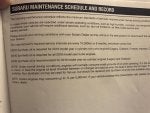Hey all, so, I reached out to SoA again, and they say they most definitely fully intend for 0W-20 to be used in the Ascent, except for occasions where it's not available to top off low oil, in which case 5W-30 can be used and swapped out at the next oil change.
To SoA:
So, do what you wish... but be aware that four times so far, via multiple channels, I've gotten responses indicating the above in one form or another.
To SoA:
From SoA:
No matter how many times I ask them, no matter how many ways, no matter through which point of contact, the answer is the same - "we meant it, use 0W-20 unless you absolutely don't have it and need to add oil, in which case use 5W-30 temporarily" and the implication that "it's possible" that some types of failure may be deemed related and thus cause uncovered warranty claims, but that will be determined on a case by case basis.
So, do what you wish... but be aware that four times so far, via multiple channels, I've gotten responses indicating the above in one form or another.











